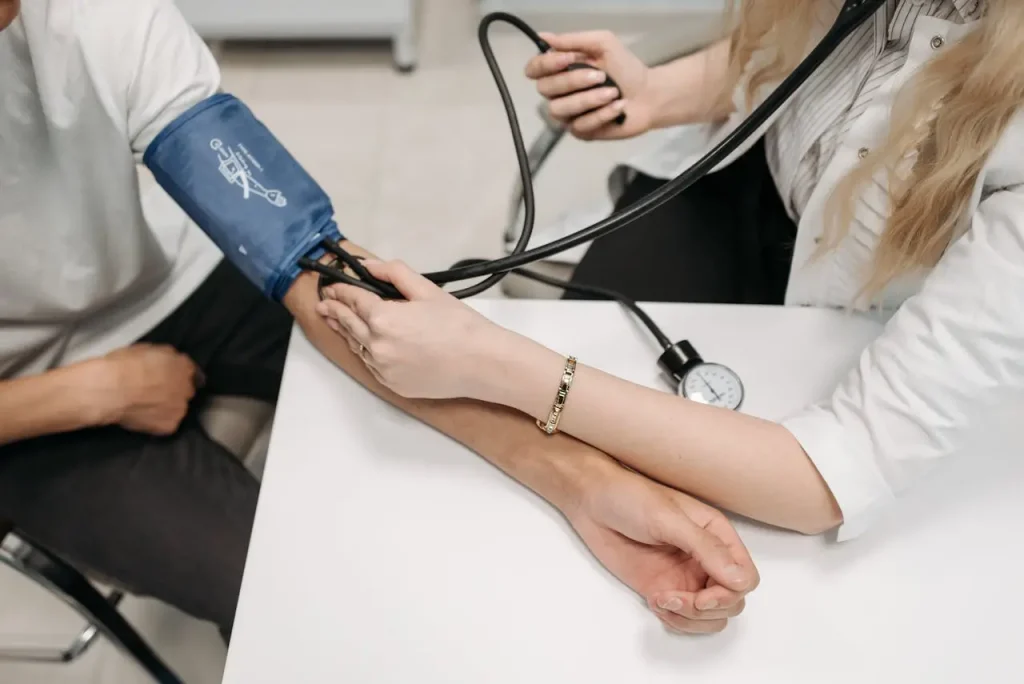How Hypertension Complications Affect Your Body

Hypertension, or high blood pressure, poses a significant health concern, influencing various bodily functions and potentially leading to severe complications if left unmanaged. Defined generally by a blood pressure reading of 130/80 mm Hg or higher, it represents a silent challenge that many might not recognize due to its often symptomless nature. Factors such as obesity, smoking, and a high-salt diet increase its risk, underscoring the condition’s ties to lifestyle choices and genetic predispositions. Despite its prevalence, with an estimated 1.28 billion adults affected globally, it’s alarming that many individuals remain unaware of their hypertensive state, which amplifies the risk of premature death and conditions like heart attack and stroke.
This article delves into the myriad ways hypertension complications can impact the body, from increasing the risk of cardiovascular diseases and stroke to the subtler signs like dizziness and its role in kidney dysfunction and visual system effects. A focus on managing normal blood pressure levels through lifestyle adjustments and medication is crucial for mitigating these risks. By understanding how hypertension interacts with vital systems and recognizing the signs of a transient ischemic attack or the interplay between high blood pressure and sexual dysfunction, individuals can take proactive steps towards healthier outcomes.
How Hypertension Affects the Cardiovascular System
Hypertension, commonly known as high blood pressure, significantly impacts the cardiovascular system, leading to a range of serious health issues. Among the most notable complications are:
- Coronary Heart Disease and Heart Failure: High blood pressure can cause the arteries that supply blood to the heart muscle to harden and narrow, a condition known as coronary artery disease. This can lead to chest pain (angina), irregular heart rhythms, or a complete blockage causing a heart attack. Over time, the increased pressure can cause the heart to become larger and weaker (heart failure), leading to a decreased ability to pump blood effectively.
- Stroke and Kidney Failure: The force of high blood pressure can damage the arteries throughout the body, making them less elastic and limiting blood flow to vital organs. This condition increases the risk of a stroke, where parts of the brain do not receive enough blood. Additionally, the kidneys, which filter excess fluid and waste from the blood, can be affected, leading to kidney failure.
- Vascular Dysfunction: Hypertension induces changes at both the histological and cellular levels in blood vessels. This includes:
- Increased secretion of procontractile factors and decreased secretion of prorelaxant factors by the endothelium, lead to a higher resistance to blood flow.
- Hypertension-induced vascular remodeling is observed as a change in the diameter of fully relaxed vessels, not explained by changes in pressure or compliance, primarily due to alterations in the tunica media, the middle layer of the blood vessel.
- The loss of anticontractile action of perivascular adipose tissue (PVAT), results in increased vascular resistance.
Risk factors for hypertensive heart disease include older age, ethnicity, being overweight, lack of physical activity, excessive dietary salt intake, smoking, alcohol intake, and the presence of diseases such as diabetes mellitus. Obesity plays a significant role due to the increased renin secretion mediated by leptin production from adipose cells, exacerbating hypertension and its complications.
The prevalence of left ventricular hypertrophy (LVH), an early manifestation of hypertensive heart disease, is about 40% among individuals with hypertension. LVH is considered a compensatory mechanism to minimize the increase in ventricular wall stress. However, it can lead to more severe conditions, including angina or heart failure. Studies have shown that black individuals tend to have increased left ventricular mass and more severe diastolic dysfunction compared to white individuals, highlighting the influence of ethnicity on the severity of hypertensive heart disease.
Managing hypertension through lifestyle changes such as a healthy diet, regular exercise, quitting smoking, reducing salt intake, and employing stress management techniques like meditation and yoga is crucial. Regular blood pressure checks are essential for early detection and prevention of hypertensive heart disease, ultimately reducing the risk of heart attack, stroke, kidney disease, and loss of vision.
Hypertension and Brain Health
Hypertension significantly influences brain health, manifesting in various cognitive and functional impairments. The relationship between high blood pressure and the brain’s well-being is multifaceted, involving direct and indirect mechanisms that affect cognitive abilities and mood. Below are key points illustrating how hypertension impacts brain health:
- Cognitive Decline and Dementia Risks:
- Hypertension is a critical risk factor for cognitive decline and dementia, including Alzheimer’s disease and vascular dementia. Studies highlight that high blood pressure, especially in midlife, correlates with an accelerated decline in cognitive functions such as memory, understanding, and executive skills.
- Long-term hypertension may lead to cerebral small and large vessel disease, contributing to brain damage and dementia. The damage results from impaired blood flow reorganization and vascular injuries within the brain.
- Antihypertensive treatment in middle-aged and young elderly subjects has shown promise in preventing late-life dementia, although the effectiveness of blood pressure control in individuals over 80 for dementia prevention remains uncertain.
- Stroke and Transient Ischemic Attack (TIA):
- A study reported in the journal Hypertension found a significant increase in stroke risk associated with hypertensive retinopathy, with those having moderate or severe conditions facing a 137 percent greater risk.
- High blood pressure emergencies, characterized by symptoms such as memory loss, trouble concentrating, and gradual loss of consciousness, can lead to stroke or TIA. These conditions underscore the importance of managing hypertension to prevent such critical outcomes.
- Vascular Brain Damage and Silent Strokes:
- Uncontrolled high blood pressure can cause the blood vessels to become scarred and narrowed, hampering blood flow to the brain and leading to vascular brain damage. This damage is akin to that caused by observable strokes, often referred to as “silent strokes.”
- The direct negative effect of hypertension on cerebral vasoreactivity, akin to that observed in stroke patients, highlights the importance of maintaining normal blood pressure levels to protect brain health.
The intricate link between hypertension and brain health emphasizes the necessity of regular blood pressure monitoring and management. Controlling hypertension through medication and lifestyle changes, such as dietary adjustments and physical activity, is crucial for mitigating the risk of cognitive decline, stroke, and dementia. Additionally, ongoing research into antihypertensive therapies and cardiovascular risk control strategies aims to further understand and improve cognition in older adults, reinforcing the importance of hypertension management in preserving brain function and quality of life.
Impact on the Kidneys
Complications arising from uncontrolled high blood pressure significantly affect the kidneys, a vital organ responsible for filtering waste products and excess fluid from the body. The impact of hypertension on kidney function can be both acute and chronic, leading to potentially life-threatening conditions that may necessitate dialysis or a kidney transplant. Below is a detailed examination of how high blood pressure can lead to kidney damage:
- Mechanism of Damage:
- Narrowing of Kidney Arteries: Over time, high blood pressure can cause the arteries around the kidneys to narrow, weaken, or harden. This impairs the blood flow to the kidneys, reducing their ability to function properly.
- Impaired Filtration: Damaged kidney arteries do not filter blood well due to insufficient oxygen and nutrients reaching the nephrons, the tiny structures within the kidneys that perform the filtration.
- Negative Spiral: Regular kidney function is crucial for blood pressure regulation. Damage to the kidneys creates a negative spiral, where more arteries become blocked and stop functioning, potentially leading to kidney failure.
- Consequences of Kidney Damage:
- High Blood Pressure Emergencies: These can include sudden loss of kidney function, highlighting the critical nature of managing blood pressure levels.
- Kidney Failure: High Blood Pressure (HBP) is the second leading cause of kidney failure. When the kidneys fail, they are unable to remove all wastes and extra fluid from the body, which can raise blood pressure even more, creating a dangerous cycle.
- Treatment Necessity: In cases of kidney failure, treatment options include dialysis, which artificially removes waste products and excess fluid from the blood, or a kidney transplant.
- Protecting Kidney Function:
- Lifestyle Changes: Implementing healthy lifestyle changes such as a low-sodium eating plan, regular physical activity, quitting smoking, and reducing alcohol intake can help control blood pressure.
- Medication: If lifestyle changes are insufficient, blood pressure medications, specifically ACE inhibitors and ARBs, can help protect the kidneys by slowing down the progression of kidney disease.
- Regular Monitoring: To detect any signs of kidney damage early, doctors may perform blood tests, urine tests, and imaging tests. Early detection is crucial for preventing further damage and managing blood pressure effectively.
Understanding the intricate relationship between hypertension and kidney health underscores the importance of regular blood pressure monitoring and management. By taking proactive steps to control blood pressure, individuals can significantly reduce the risk of kidney damage and maintain overall health.
Effects on the Visual System
Hypertension, or high blood pressure, significantly impacts the visual system, leading to various eye conditions that can impair vision. The effects of hypertension on the visual system are multifaceted, involving damage to the blood vessels in the retina, fluid buildup under the retina, and nerve damage. These conditions include:
- Hypertensive Retinopathy: This condition arises from high blood pressure damaging the blood vessels in the retina. Symptoms often remain unnoticed until the disease has advanced, potentially leading to double vision, dim vision, or complete vision loss, alongside headaches. Diagnosis is achieved using an ophthalmoscope, with the severity graded on a scale of 1 to 4. The primary treatment involves controlling high blood pressure to prevent further damage.
- Choroidopathy and Optic Neuropathy: Fluid buildup under the retina, known as choroidopathy, can lead to distorted vision or scarring that impairs vision. Optic neuropathy, on the other hand, results from blocked blood flow damaging the optic nerve, leading to temporary or permanent vision loss.
The relationship between hypertension and the visual system extends beyond these conditions. High blood pressure can exacerbate diabetic retinopathy, increase intraocular pressure, and trigger the formation of thromboembolic lesions. These complications underline the importance of managing blood pressure to protect vision.
Eye doctors play a pivotal role in the early detection of high blood pressure through routine eye examinations. Changes in the blood vessels in the retina may indicate hypertension before other symptoms become apparent. Regular blood pressure checks are crucial for preventing vision loss and other health complications associated with hypertension. The following table summarizes the effects of hypertension on the visual system and the importance of blood pressure management:
| Condition | Description | Diagnosis | Management |
|---|---|---|---|
| Hypertensive Retinopathy | Damage to the retina’s blood vessels, potentially leading to vision loss. | Ophthalmoscope examination, graded on a scale of 1 to 4. | Control high blood pressure. |
| Choroidopathy | Fluid buildup under the retina, causing distorted vision or scarring. | Clinical diagnosis based on symptoms and eye examination. | Manage blood pressure to prevent further fluid buildup. |
| Optic Neuropathy | Nerve damage due to blocked blood flow, causing temporary or permanent vision loss. | Eye examination and assessment of symptoms. | Blood pressure management to restore or maintain blood flow. |
This table highlights the critical role of blood pressure management in preventing and treating visual system complications caused by hypertension. By maintaining normal blood pressure levels, individuals can significantly reduce the risk of vision impairment and other health issues related to high blood pressure.
Hypertension’s Role in Sexual Dysfunction
Hypertension’s role in sexual dysfunction is significant and multifaceted, impacting both men and women in various ways. The interplay between high blood pressure and sexual health can be understood through the following points:
Men and Hypertension-Induced Sexual Dysfunction:
- Erectile Dysfunction (ED): High blood pressure may lead to reduced blood flow to the penis due to damaged blood vessels and arteries narrowing, almost doubling the likelihood of impaired penile blood flow and ED in hypertensive men compared to those with normal blood pressure.
- Ejaculation and Libido: Beyond ED, hypertension can affect ejaculation and lower sex drive, with about 30% of men with hypertension experiencing ED.
- Medication Side Effects: Certain high blood pressure medications, especially older beta blockers like propranolol, can contribute to sexual problems. However, switching to newer medications or angiotensin II antagonists (AIIAs) can improve erectile function and sexual activity.
Women and Hypertension-Induced Sexual Dysfunction:
- Arousal and Orgasm: Women with high blood pressure might face difficulties with arousal, achieving orgasm, and vaginal dryness due to reduced blood flow to the vagina.
- Libido: The prevalence of sexual dysfunction in women, including diminished libido and inadequacy of vaginal lubrication, is estimated to be present in about 20-50% of hypertensive women.
- Impact of Medications: Similar to men, the sexual side effects of high blood pressure medications can include decreased blood flow and hormonal changes that may affect sexual function.
Managing Hypertension to Improve Sexual Health:
- Medication Adjustment: For those experiencing sexual dysfunction as a side effect of hypertension medications, discussing alternative treatments with a healthcare provider can be beneficial. Nebivolol, for instance, has shown positive effects on erectile dysfunction in men.
- Lifestyle Changes: Implementing healthy lifestyle modifications such as regular physical activity, a balanced diet, and quitting smoking can help manage hypertension and potentially alleviate sexual dysfunction.
- Open Communication: High blood pressure can weaken relationships due to decreased sexual satisfaction. Open communication with partners and healthcare providers about sexual health concerns is crucial for managing both hypertension and its impact on sexual function.
This overview underscores the importance of recognizing and addressing hypertension’s role in sexual dysfunction. Through careful management of blood pressure and consideration of medication side effects, individuals can take steps toward improving both their cardiovascular health and sexual well-being.
Conclusion
Through this comprehensive exploration, we’ve highlighted the far-reaching effects of hypertension across various bodily systems, demonstrating its role as more than just a cardiovascular ailment. It’s evident that high blood pressure insidiously affects everything from brain health and kidney function to vision and sexual well-being, underscoring the critical importance of managing this condition. By taking proactive steps towards maintaining normal blood pressure, such as adopting healthier lifestyle choices and adhering to medication regimens, individuals can significantly mitigate these risks and improve their overall health.
The discussion also brings to light the significance of regular blood pressure monitoring and early intervention. Given hypertension’s silent nature and its potential for serious complications, awareness and education are key. Engaging in regular check-ups, understanding the implications of uncontrolled blood pressure, and maintaining open communication with healthcare providers about any concerns, including the impact of medications on aspects like sexual function, are vital. Ultimately, the goal is to not only extend life expectancy but also enhance the quality of life, making hypertension management a cornerstone of holistic well-being.


